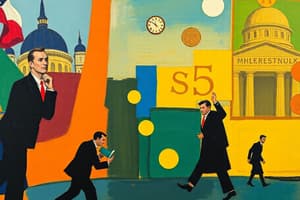Podcast
Questions and Answers
What does the term hyperinflation refer to?
What does the term hyperinflation refer to?
- A period of very low inflation
- A period of very high inflation (correct)
- Deflation
- Stable inflation
What happens to the value of money as the price level rises?
What happens to the value of money as the price level rises?
The value of money falls
What can P represent in economics?
What can P represent in economics?
Overall price level
A 2 percent increase in the money supply causes the price level to rise by 2 percent.
A 2 percent increase in the money supply causes the price level to rise by 2 percent.
Who determines the supply of money?
Who determines the supply of money?
In a deflationary period, creditors gain at the expense of debtors.
In a deflationary period, creditors gain at the expense of debtors.
What are economic variables measured in goods called?
What are economic variables measured in goods called?
Changes in the money supply affect real variables.
Changes in the money supply affect real variables.
What does printing money to finance government expenditures impose?
What does printing money to finance government expenditures impose?
What does the Fisher effect state?
What does the Fisher effect state?
Most economists believe the quantity theory is a good explanation of short-run behavior of inflation.
Most economists believe the quantity theory is a good explanation of short-run behavior of inflation.
When the price level rises, what do people have to pay more for?
When the price level rises, what do people have to pay more for?
Why does a rise in the price level mean the value of money is lower?
Why does a rise in the price level mean the value of money is lower?
What is the price of basket goods measured in?
What is the price of basket goods measured in?
If P is the price level, what does 1/P represent?
If P is the price level, what does 1/P represent?
Inflation drives down prices.
Inflation drives down prices.
Who developed the quantity theory of money?
Who developed the quantity theory of money?
What are the two approaches to studying the quantity theory of money?
What are the two approaches to studying the quantity theory of money?
What determines the money supply in the real world?
What determines the money supply in the real world?
How does an increase in P affect money demand?
How does an increase in P affect money demand?
The quantity of money demanded is ______ related to the value of money and ______ related to P, other things equal.
The quantity of money demanded is ______ related to the value of money and ______ related to P, other things equal.
The Fed sets Money Supply (MS) at some fixed value regardless of P.
The Fed sets Money Supply (MS) at some fixed value regardless of P.
What happens for the money-supply demand when there is a fall in the value of money?
What happens for the money-supply demand when there is a fall in the value of money?
What adjusts to equate quantity of money demanded with money supply?
What adjusts to equate quantity of money demanded with money supply?
What are nominal variables measured in?
What are nominal variables measured in?
What are real variables measured in?
What are real variables measured in?
What is a relative price?
What is a relative price?
What is the classical dichotomy?
What is the classical dichotomy?
What did Hume and classical economists suggest about monetary developments?
What did Hume and classical economists suggest about monetary developments?
What does monetary neutrality state?
What does monetary neutrality state?
Most economists believe the classical dichotomy and neutrality of money describe the economy in the short run.
Most economists believe the classical dichotomy and neutrality of money describe the economy in the short run.
What does the velocity of money represent?
What does the velocity of money represent?
What is defined as inflation exceeding 50% per month?
What is defined as inflation exceeding 50% per month?
What is the inflation fallacy?
What is the inflation fallacy?
What are shoeleather costs?
What are shoeleather costs?
Flashcards are hidden until you start studying
Study Notes
Hyperinflation and Inflation
- Hyperinflation signifies a period of extremely high inflation, often exceeding 50% monthly.
- Inflation occurs when the price level rises, decreasing the value of money as more dollars are needed to purchase goods.
Value of Money and Price Level
- The price level (P) represents the cost of goods and services; an increase in P indicates a decline in the value of money.
- The value of money can be expressed as 1/P, where a lower P indicates a higher value of money in terms of goods and services.
Quantity Theory of Money
- A 2% increase in the money supply leads to a corresponding 2% rise in the price level.
- The quantity theory provides a framework to analyze inflation's long-term behavior.
Money Supply and Economic Dynamics
- The Federal Reserve System determines the money supply, influencing inflation and economic stability.
- An unexpected shift to deflation benefits creditors over debtors, as the value of money rises.
Nominal vs. Real Variables
- Nominal variables are measured in monetary units, such as nominal GDP, whereas real variables are expressed in physical units, like real GDP.
- The classical dichotomy posits that changes in the money supply impact nominal variables but not real variables, supporting monetary neutrality in the long run.
Monetary Impact on Demand and Value
- An increase in the price level (P) reduces money's value and raises the quantity of money demanded.
- The relationship between money demanded and value is negatively correlated, while money demanded and price level are positively correlated.
Government Actions and Economic Consequences
- Printing money to finance government expenditures acts as a tax on money holders.
- Increased inflation drives up prices and reduces the purchasing power of money.
Costs of Inflation
- Shoeleather costs arise from resources wasted when inflation prompts individuals to minimize cash holdings.
- The inflation fallacy refers to the misconception that inflation uniformly erodes real incomes.
The Velocity of Money
- The velocity of money measures how frequently money exchanges hands and indicates economic activity; a higher velocity implies a more vigorous economy.
Studying That Suits You
Use AI to generate personalized quizzes and flashcards to suit your learning preferences.




